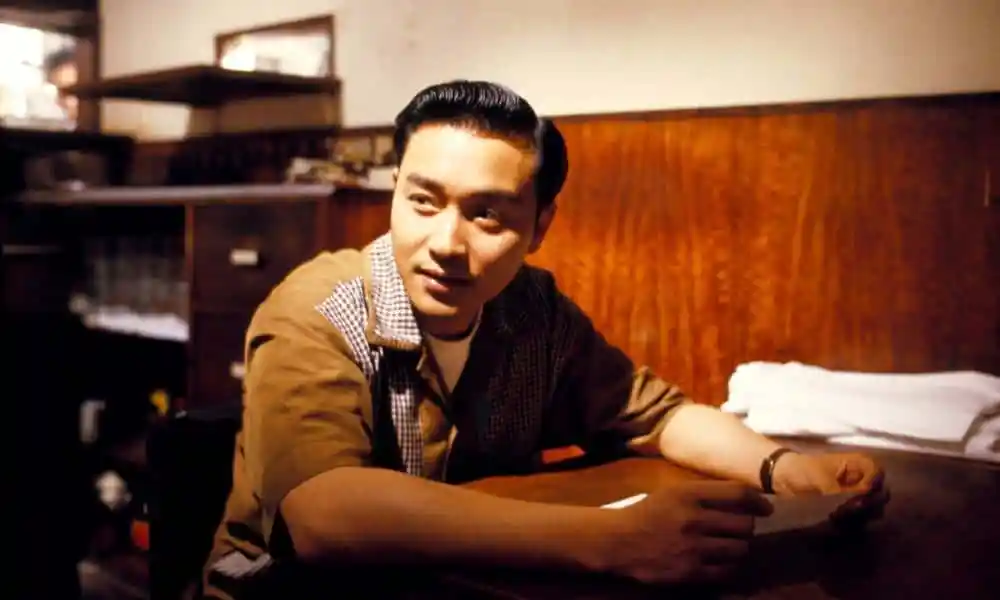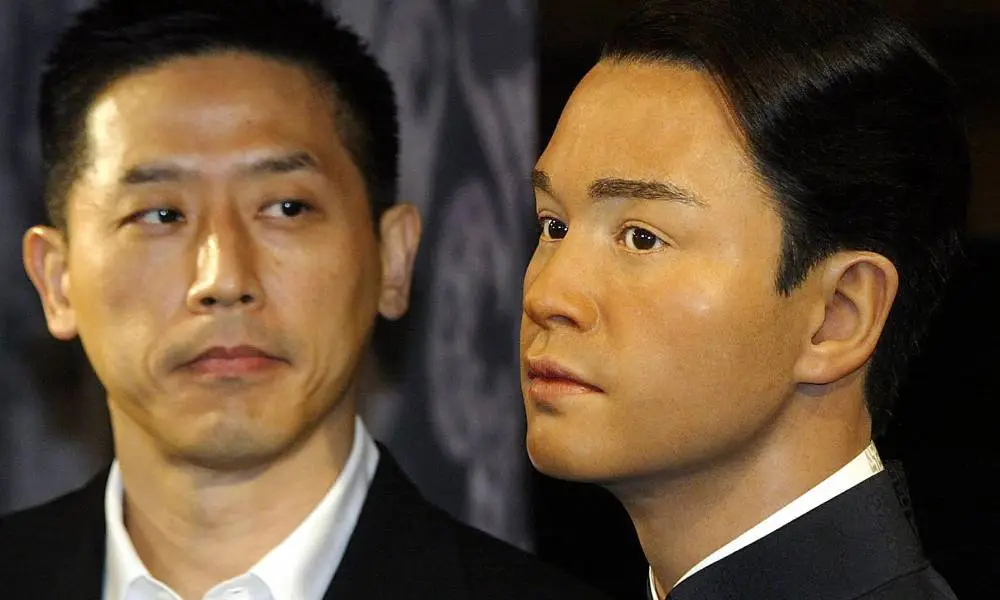Hong Kong’s king of pop, singer Leslie Cheung poses on stage during a solo concert at Shanghai Stadium late 16 September 2000. (Liu Jin/AFP via Getty)
Hong Kong superstar Leslie Cheung may have died almost two decades ago, but he is still remembered worldwide for his amazing talent and LGBT+ icon status.
Cheung, who has been dubbed the “King of Canto-pop”, was an iconic singer, award-winning actor and LGBT+ pioneer in a time when not many stars were open about their identities.
Throughout his storied 26-year career, Cheung released several successful albums and acted in dozens of films. He also won critical acclaim for his roles portraying queer characters in film.
He gained international attention with his portrayal of Cheng Dieyi, an androgynous Peking Opera star, in the film Farewell My Concubine. The film would go on to win the Palme d’Or at Cannes in 1993 and was nominated for two Oscars in 1994.
Cheung lived his truth openly during a time when the LGBT+ community was heavily persecuted. He even declared his love for a man, his childhood friend and long-term partner Daffy Tong, during a live concert in 1997.
On stage, Cheung unleashed a sexually fluid charm. His defining performance came in a 1997 concert where he danced intimately with a male dancer to his song “Red”. He wore a black suit with a pair of sparkling crimson high-heels.
It was Leslie Cheung’s ‘destiny to be in showbiz’
Born in Hong Kong in 1956, Leslie Cheung was the youngest of 10 children. His father was a tailor who made suits for several Hollywood stars including Marlon Brando, Cary Grant and Alfred Hitchcock.
Cheung initially followed in his father’s footsteps and studied textile management at university. But he said in an interview that “there was no way of escaping my destiny to be in show business”, South Morning China Post reported.

He took his first steps into the music industry in 1977 after he performed Don McLean’s hit song “American Pie” for a singing competition. He came in second place, but he was undeterred.
Despite his later superstar status, Cheung said he was initially not a popular singer. He recalled how an audience once told him to “get off the stage” during his first public performance after the singing competition.
“In those days when everything was full of uncertainty … I remember well that my singing career at the early stage was like ‘a person running into a rock’, full of despair and obstacles,” Cheung said.
He gained widespread recognition for his singing talent after he released his first album The Window Blows On in 1981 and a hit single “Monica”, a cover of a Japanese song, in 1984.
His status as one of the most famous people in the Canto-pop music scene led to a successful stage, film and TV career.
He achieved widespread recognition as an actor for his varied roles as a womaniser in Days of Being Wild (1990), the Peking opera actor in Farewell My Concubine (1993) and the LGBT+ drama Happy Together (1997). Kar-Wai Wong won the best director award at the Cannes Film Festival in 1997 for Happy Together.
After finding great success in the music and film industry, Leslie Cheung opened up more about his personal life.
In 1992, Cheung stated during an interview that his “mind is bisexual”, according to bi.org. He said, at the time, that it was “easy” for him to “love a woman” and to “love a man too”.
It was during the 1997 concert that saw him dance with another man that he also dedicated a song to the two “loves of his life” – his mother and his long-term partner, Daffy Tong. It was the first time Cheung introduced his partner and proclaimed that he was in a same-sex relationship to his fans.

Cheung publicly declaring his love for another man was an intensely brave move. Homosexuality was only decriminalised in China in 1997. But it wasn’t until 2001 that it was declassified as a mental disorder.
Adult gay sex was decriminalised in Hong Kong in 1991. But Travis Kong, an associate professor of sociology researching gay culture at the University of Hong Kong, told BBC Chinese in 2018 that queer men were still being called “AIDS man” and “pervert” in the 1990s.
“In a society so oppressive to the LGBT community, the coming out of such a renowned superstar had a huge effect on the general public,” Kong said.
Sadly, Leslie Cheung received harsh backlash for living his truth.
On 1 April 2003, the beloved actor and singer died by suicide. He was only 46 years old.
Many fans initially didn’t believe the reports of his death because it occurred on 1 April, Billboard reported.
In the years since, dedicated fans have remembered the pop star, who was affectionately known as “Gor Gor” or elder brother in Cantonese.
Last year, on the 18th anniversary of Cheung’s death, Tony posted a photo on Instagram of the late singer on the yacht with the caption: “Miss you”.
In 2019, South China Morning Post interviewed dedicated Cheung fan Lu Xiaochuan, who opened a cafe in honour of the late singer and actor. The cafe was named after Cheung’s love ballad “For Your Heart Only” and opened in 2007.
Lu described Cheung as being “different from all the other stars” as he “radiated a glow on stage”. He added that fans of all ages visited his cafe to honour the late icon, and he said there was a whole new generation of people discovering Cheung’s work after his death.
“The age range of customers surprises me,” Lu said. “I thought people who like Gor-gor would be born in the 70s or 80s. But many of his fans are young people who only discovered him after his death.”
Suicide is preventable. Readers who are affected by the issues raised in this story are encouraged to contact Samaritans on 116 123 (www.samaritans.org), or Mind on 0300 123 3393 (www.mind.org.uk). Readers in the US are encouraged to contact the National Suicide Prevention Line on 1-800-273-8255.
